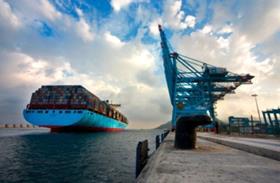
International shipping group Maersk Line will take deliver of 16 new container vessels in 2010-12, after parent company AP Møller-Maersk signed an agreement with Korea-based Daewoo Shipbuilding and Marine Engineering.
The vessels will each have a capacity of 7,450 TEUs (twenty-foot equivalent units) and each will be equipped with reefer plugs enabling them to carry 1,700 refrigerated containers, the highest number ever carried on a container vessel.
 Maersk Line expects to deploy the vessels in the trades between the east coast of South America and Asia and Europe, routes primarily driven by the export of food products including fresh fruit. 'We expect a continued strong growth in these markets,' commented senior vice-president Michel Deleuran (pictured right), head of network and product at Maersk Line. 'We believe thatthis order shows our long-term commitment to providing service andsupport to our customers' increasing business.'
Maersk Line expects to deploy the vessels in the trades between the east coast of South America and Asia and Europe, routes primarily driven by the export of food products including fresh fruit. 'We expect a continued strong growth in these markets,' commented senior vice-president Michel Deleuran (pictured right), head of network and product at Maersk Line. 'We believe thatthis order shows our long-term commitment to providing service andsupport to our customers' increasing business.'
The rapidly growing consumer markets of Brazil and Argentina are understod to be key drivers of Maersk's decision to place more vessels on the routes. In the last five years, trade between Asia and the east coast ofSouth America has grown by an average of more than 20 per cent every year. In the nextfive years, growth is expected to remain in the double digits, with increased opportunities for containerised shipping as a result.
The new ships are reportedly designed to meet the highest demands for safe and economic transportation of goods in trade between Asia and South America. In addition, each vessel is equipped with a waste heat recovery system, which reuses excess heat from the exhaust and thus generates energy for propulsion of the vessel or on-board electricity consumption. The reduction in fuel consumption is set to result in a corresponding reduction of emissions, the company said.
'We are very excited with this order and the opportunities these vessels will provide our customers in South America,' continued Mr Deleuran. 'We are confident that the vessels will enable us to continue to offer competitive container shipping based on a modern, economical, and environmentally friendly fleet.'






No comments yet